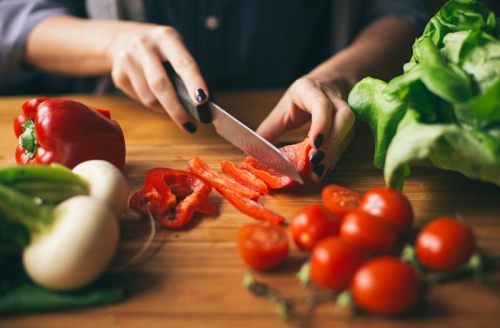Our editors independently select these products. Making a purchase through our links may earn Well+Good a commission
How one new study could completely shift the way depression is treated
Dr. Drew Ramsey shares the three biggest takeaways of a major new study that shows the power of a nutritious diet as a treatment for depression.

While chocolate definitely delivers when it comes to a quick mood boost, for long-term happiness, science keeps pointing in the other direction. In other words, there’s a correlation between eating salad and warding off depression—for real.
But Australia’s Deakin University took things to a whole new level by performing the first randomized controlled trial directly testing a healthy diet’s effectiveness as a depression treatment. (Randomized trials are considered the most rigorous way show a cause-and-effect relationship—so their findings generally get more respect.) The study, which included patients with moderate to severe depression, found that certain foods can be powerful in treating the disorder—even more than having a strong support system. (And no, weight loss wasn’t the reason.)
“We now have real evidence to back up what’s good common sense: that eating well doesn’t just benefit your body, but it also benefits your brain,” says Drew Ramsey, MD, who has written a book, Eat Complete, on that very topic.
There’s perhaps no bigger advocate for the food-as-medicine approach than Dr. Ramsey, assistant clinical professor of psychiatry at Columbia University Medical Center. He’s been talking about the mind-gut connection for years and opened the The Brain Food Clinic, a nutritional psychiatry treatment center with the study’s lead researcher, Felice Jacka, PhD—and he’s been known to prescribe kale and cauliflower.
Here, Dr. Ramsey reveals three crucial takeaways from the study and what it means for the future of treating depression.

The mood-boosting diet
Now the big question: What foods in particular are so powerful in treating depression that they showed better results than the participants with a strong social support system? Two words: Mediterranean Diet. Whole foods, legumes, lean red meat, fruits, veggies, olive oil, and nuts were all part of the treatment meal plan.
While it’s tempting to want to dig deeper, figuring out which exact vitamins are the cause, Dr. Ramsey says the power is really in the foods in their whole form: “So often we think about omega-3 fats, vitamin B12, zinc, magnesium, and iron. We can make a nice list of nutrients, but what’s [more] helpful is focusing on specific food groups,” he says.
“We can make a nice list of nutrients, but what’s [more] helpful is focusing on specific food groups.”
Not only does, say, telling someone to incorporate more salmon into their diet stay front-of-mind more than advising them to eat more omega-3s, Dr. Ramsey says nutrients are more functional and better absorbed when consumed in food form versus on their own as supplements. That’s not to say taking vitamins can’t help—a nutritious diet just seems to be more effective.
Why? Two reasons: lower inflammation and the mind-gut connection, the study’s authors say. Yep, it’s that whole “second brain” mentality proving itself again.

It’s also about self-care
It’s not just what you eat, but the prep that goes into, Dr. Ramsey says. “Meal creation is something that connects us and also allows for creativity,” he says. “There’s an indication that you’re nourishing yourself.”
And he makes another good point: No one is going to come over to share a bowl of vitamins. After all, cooking and eating are hugely important in virtually every culture.

Healthy eating can be budget-friendly
Another huge takeaway from the study: while the average Australian spends $138 a week on food, the patients in the study who followed the Mediterranean Diet only spent an average of $112. “Eating for your health doesn’t have to be expensive,” Dr. Ramsey says. While the study doesn’t list the foods on the shopping list, this isn’t the first time eating healthy has proved to be affordable—though it does take some creativity.
Now that there is legit confirmation that a whole-food, diet rich in protein, healthy fats, and veggies can treat depression, there is a potential blueprint for psychologists, psychiatrists, social workers, and other experts in mental health to use—a massive gain considering many don’t even ask their patients what they eat on a regular basis. “A few of us have been preaching this message. Now we actually have clinical evidence,” Dr. Ramsey says.
Not only can you eat yourself happier, you can eat yourself smarter too. (And here’s a way to lower stress—with dessert.)










